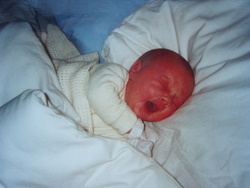 Here I look at the subject of a woman’s health in the first weeks and months after giving birth. This period was traditionally navigated with great care in China. A famous Chinese doctor, Zhang Jing Yue (1518 – 1639), penned many texts on gynaecology and paediatrics. He was writing as early as 1624 about a mother’s tiredness after giving birth, and the measures to be taken to promote her full recovery.
Here I look at the subject of a woman’s health in the first weeks and months after giving birth. This period was traditionally navigated with great care in China. A famous Chinese doctor, Zhang Jing Yue (1518 – 1639), penned many texts on gynaecology and paediatrics. He was writing as early as 1624 about a mother’s tiredness after giving birth, and the measures to be taken to promote her full recovery.
So from a traditional Chinese perspective, the first month is considered particularly crucial. It is a time when plenty of rest, combined with gentle exercise, should be part of daily routine.
Contrast this with the actual situation in the UK in the twenty-first century, where women often find there is little time for recuperation. They may no longer have relatives living close by to lend a hand with the baby or older siblings. Even if a partner has paternity leave available, it may be awkward or unaffordable to take much. Pleasurable and fulfilling as it is to have a new baby in the home, there is a lot to do during the day, and sleep may be disturbed at night. All this comes on top of the demands of having been pregnant for nine months.
In addition to the resulting fatigue, there are lifestyle changes to get used to. Many women have previously had jobs from which they derived daily intellectual challenge, social interaction and status. It can be hard to remember that being at home with a baby is actually the most important job in the world.
There are also changes in family dynamics. Partners relate to each other differently, and older siblings may have their insecure moments. Out of this complex melting pot can arise emotions you did not expect: frustration, irritability, anxiety and even mild depression.
Turning then to the conditions which women bring along to my practice, tiredness and exhaustion is the most common. I also see post-natal depression, irritability, anxiety, difficulty re-establishing a sleep pattern, and other conditions such as insufficient lactation and Bell’s palsy. Sometimes women are seeking treatment up to two years after the birth, when issues they hoped would resolve of their own accord, have not done so.
In all cases, it is important to establish that you are getting sufficient rest, and enjoying a diet which is meeting your needs. This applies especially if you are breastfeeding. We will look at your symptoms, and compare your health now with any patterns which have been apparent in the past. Your health during pregnancy, and some details of your labour, are also important. In this way, I can tailor some dietary and lifestyle recommendations to your constitutional leanings. Sometimes, supplements may be indicated too: for example, although further research is needed, a 2024 systematic review suggests that a higher likelihood of ante- and post-natal depression may be associated with poor vitamin D status.
Then I will offer you an appropriate treatment plan to try to help with your symptoms. This may involve weekly visits for an agreed period, though do not worry if we have to work primarily around days and times when someone can look after your baby. Some treatment is better than no treatment.
If there is anything you would like to discuss around treatment for issues arising after having a baby, then you are always welcome to telephone me. Below you can read the results of some of the research which has been undertaken into post-natal acupuncture. The trials vary in quality, but systematic reviews and randomised controlled trials are generally considered to provide the highest quality evidence. If you would like to read more about evidence quality, I would refer you to the British Acupuncture Council’s description of the evidence pyramid.

 The results of a pilot study by Italian researchers on acupuncture and breastfeeding, suggest that it can support women in maintaining breastfeeding for longer. Ninety women were randomly allocated to receive either acupuncture or simple observation. The acupuncture group received treatment twice a week for three weeks. The observation group made weekly visits to the clinic for a midwife to observe breastfeeding and give routine care.
The results of a pilot study by Italian researchers on acupuncture and breastfeeding, suggest that it can support women in maintaining breastfeeding for longer. Ninety women were randomly allocated to receive either acupuncture or simple observation. The acupuncture group received treatment twice a week for three weeks. The observation group made weekly visits to the clinic for a midwife to observe breastfeeding and give routine care.